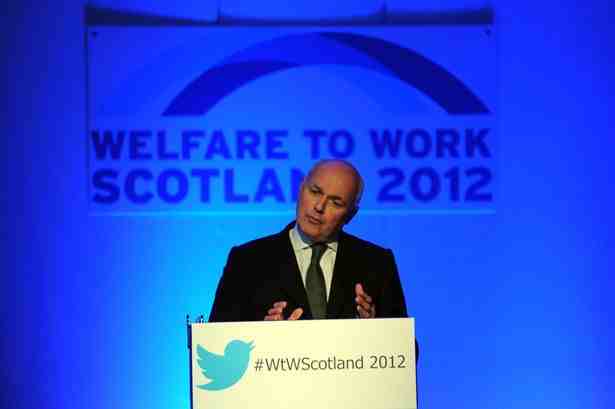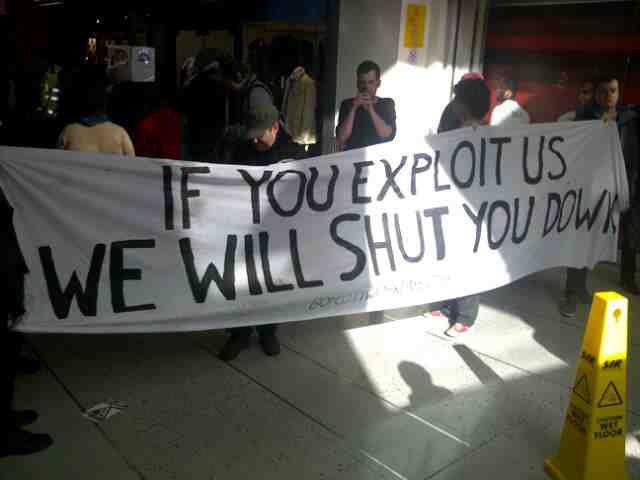
Iain Duncan Smith speaks at Glasgow Welfare to Work conference

‘If the unemployed do not take part they can have their benefits reduced for up to three years.
‘They can have it all stopped, not just reduced.
‘following a rule change in December, sick and disabled benefit claimants could also be made to work unpaid or face having their benefits cut off’‘It is worse.
‘There is a time limit to the MWA for able-bodied jobseekers.
‘There is NO time limit for disabled people – they can be on slavefare for life. And if their disability means they cannot do the slavefare placement they are sanctioned.’
http://discussion.guardian.co.uk/comment-permalink/21605353
GUARDIAN: ‘Sick and disabled braced for enforced work-for-benefits programme’ ~ BTC SAYS: PLEASE USE OUR REGULATIONS 29 & 35 CAMPAIGN MATERIALS! Posted on December 3, 2012
No Pasarán! Our struggle continues apace ……
The Department for Work and Pensions has blamed a band of activists for intimidating high-street charities into quitting a major government employment programme.
On Monday night Sue Ryder became the third charity this month to leave the DWP’s mandatory work activity (MWA) scheme, which makes jobseekers work at least 30 hours a week unpaid doing activities which benefit the community such as recycling, park maintenance and in retail shops and warehouses for the third sector.
If the unemployed do not take part they can have their benefits reduced for up to three years.
Early this month the animal charity PDSA and deafblind charity Sense also withdrew from the scheme, citing disquiet over the controversial use of so-called “forced volunteers” in their stores.
Their departures follow four other charities late last year – the British Heart Foundation, Cancer Research, Age UK and Scope – leading to fears that the entire scheme could soon become unviable if not enough month-long placements can be found.
The care and hospice provider Sue Ryder said that around 1,000 of its volunteers came from government schemes but it was withdrawing “with a heavy heart” to protect staff from an online campaign of harassment.
In a statement the charity said: “Recent online lobbying using strong and emotive language and making misleading claims about our volunteering practices has presented a risk to our critical work. Equally we need to protect our service users, their families, our supporters and Sue Ryder staff and volunteers from any further distress.
“Therefore, we have taken the decision to withdraw from the DWP’s mandatory back-to-work schemes. We do this with a heavy heart as our volunteers, including those on placements, regularly tell us how much they have benefited from their time with us and we are immensely grateful to them for their time and dedication.”
The DWP said it was “deeply regrettable that a small number of people have targeted charities and subjected them to intimidation and abuse in an effort to disrupt the operation of this scheme.” It added that it was grateful for the support of remaining charities “in helping unemployed people … move closer to employment”.
The campaigning group Boycott Workfare, which has branded MWA and other work-for-your-benefit schemes “slave labour”, vehemently denied any intimidation and said comments left on Sue Ryder’s Facebook page were public and showed the strength of opposition to programmes under which, following a rule change in December, sick and disabled benefit claimants could also be made to work unpaid or face having their benefits cut off.
A spokesperson for Boycott Workfare said: “The fact that so many charities have withdrawn and are now refusing to take part is testament to the strength of public opposition, and will make it more difficult for the coalition to introduce further schemes. Workfare is wobbling. If we keep pushing it will fall.”
An official evaluation of MWA in December found that organisations paid to set up the work experience placements were struggling to meet demand after the withdrawal of charities.
The 158-page DWP report backed activists’ claims that charities and community organisations were relying on unpaid jobseekers to staff their operations.
The report found:
“The majority of the hosts describe getting involved in MWA to provide staff for their organisations, which in many cases relied on unpaid staff to operate. Indeed several described coming to rely on MWA to provide a steady supply of staff.”Kirsty McHugh, chief executive of the employment industry body ERSA, said she did not believe MWA was coming under strain.
“It is a real shame when any organisation withdraws from a scheme. However, we have no evidence that work placements are proving harder to find.
“Work experience is a really important step to helping people to gain the confidence and skills to enter employment and we are pleased that so many charities and employers continue to recognise this.”